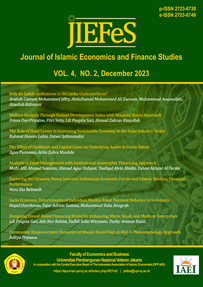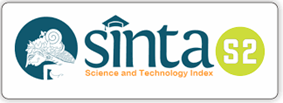Why do Zakah Institutions in Sri Lanka Underperform?
DOI:
https://doi.org/10.47700/jiefes.v4i2.6157Keywords:
Islamic Jurisprudence , Sri Lankan Muslims, Well-being, Zakah InstitutionsAbstract
Zakah as a compulsory worship obligation of Muslims has been practiced for several decades in an institutionalized form in Sri Lanka. Although the institutionalized mechanism contributes to some improvements in socioeconomic conditions, recent research highlighted that the impact of such a model is yet below the expected level. The institutional zakah practice in Sri Lanka has remained essentially informal lacking any state recognition or zakah specific regulation. This paper examined the contemporary challenges and root causes of the zakah institutions’ underperformance in Sri Lanka. This paper took a qualitative methodology and collected primary and secondary data through official documents, interviews, and published literature. The empirical findings of the paper reveal a threefold challenge that contributes to the inefficient institutional zakah performance, namely low collection, ineffective disbursement, and external hurdles. The paper suggests that the prolonged dominant informal and individualist zakah culture of Sri Lankan Muslims fails to actualize the designated goals of zakah and this in turn has contributed to the contemporary challenges. The paper highlights the need for developing an alternative jurisprudential methodology that has the potential to offer sensible remedies to the contemporary identified challenges. The paper suggests that zakah institutions must thoroughly re-evaluate existing zakah applications to improve the effectiveness and efficiency of their zakah management systems. It is also suggested that it would be helpful to establish a National Zakah Consultative Body that can advise the government on adopting effective regulations or guidance relevant to zakah management for the Sri Lankan Muslim minority.
References
Abdul Rauff Salithamby, Zulkarnain A. Hatta, Adi Fahrudin. (2022). Institutionalized zakāh in addressing well-being problems in non-Muslim Majority Sri Lanka. Journal of King Abdulaziz University (JKAU: Islamic Econ)., Vol. 35 No. 2, pp: 43-54.
Abou El Fadl, Khaled. (1994). Islamic Law and Muslim Minorities: The Juristic Discourse on Muslim Minorities from Second to the Eleven Centuries. Islamic Law and Society.
Aiyoob Ali, C. Zakah Oru Kootuk Kadamai (Institutionalized Zakah Management and Its Significance), (2008). (Colombo: Al-Huda).
Al Amaren Emad Mohammad, Hamad Ahmed M A, Al Mashhour Omar Farouk, Al Mashni Mohammed Ibrahim. An Introduction to the Legal Research Method: To Clear the Blurred Image on How Students Understand the Method of the Legal Science Research. International Journal of Multidisciplinary Sciences and Advanced Technology.Vol 1 No 9 (2020) 50–55.
Al Hirshi Ali. 1997. Hashiyatil Khurshi. (Bayrut: Darul Kutubul Ilmiyya). 2: 518.
Al-Kāsānī, Badāʼiʻ al-ṣanāʼiʻ fī tartīb al-sharāʼi, (2004). (al-Qāhirah: Dār al-Ḥadīth). 8: 379.
Al-Nawawī, kitāb al-Majmū. (2007). (Bayrūt: Dār al-Kutub al-ʻIlmiya), 6: 455- 458.
Alam, Shahbaz & Uddin Ahmed, Mezbah, (“A Critique of Zakah Practices in India”), International Journal of Zakah and Islamic Philanthropy, (Vol. 2, Issue 2, 2020), 174-176.
Aliyu, Shehu U.R. A Treatise on Socio-economic Roles of Zakah. (2017). MPRA, Munich Personal RePEc Archive. http://mpra.ub.uni-muenchen.de/81155/.
Alwānī, T.B. (2010). Towards a Fiqh for Minorities: Some Basic Reflection. Translated by Shamis A. Ashur, (London: International Institute of Islamic Thought).
Careem M.J.M. Arafath, 2020. Zakah for Jeweleries used by Women: A Juristic Study, (Beruwela: Knowledge Publication), p 14Chapra, Umer, M. (1993). Islam, and Economic Development. (Islamabad: Islamic Research Institute Press), 75-85.
Chouduri Masudul Alarm, "Interrelationship between zakah, Islamic Bank and the economy: A theoretical Exploration", Emerald Group Publishing Limited, Managerial Finance, (Vol. 20 No. 1, 2021), 129.
Dorloh, Sulaiman & Mohammadtahir Cheumar, Usman, et al., “Institution Zakah in Thailand: A Case Study of The Management of Zakah Funds in the Four Southern Border Provinces of Thailand”, International Conference on Contemporary Issues in Islamic Finance, (2020).
El-Ashker, Ahmed Abdel-Fattah & Muhammad Sirajul Haq, “Institutional Framework of Zakah: Dimensions and Implications”, Seminar Proceedings No. 23, Jeddah: Islamic Research and Training Institute, Islamic Development Bank, (1995).
Faiz Muhammed 1995, Relationship Between Obligatory Official Zakah Collection and Voluntary Zakah Collection by Charitable organisations, Institutional Framework of Zakah: Dimensions and Implications, (Jeddah: Islamic Research and Training Institute, 1995), 168.
Handbook, Kalutara Zakah Foundation Estd 2005, (Kalutara: Kalutara Zakah Institution, 2015), 13.
Ibn Qudāmah. (1997). al-Mughnī, (al-Riyāḍ: Dār ʻĀlam al-Kutub), 5: 5-8.
Ibn Rushd al-Qurṭubī. (1996). Bidāyat al-mujtahid wa-nihāyat al-muqtaṣid. (Bayrūt: Dār al-Kutub al-ʻIlmiya), 3: 56-58.
Imtiyaz, A.R.M. (“The Easter Sunday Bombings and Crisis Facing Sri Lanka’s Muslims”), Journal of Asian and African Studies, (2019), 3-4.
Intezar M. Tariq, Zia Saad Bin, "Zakah, SDGs, and Poverty Alleviation of Muslims in India", 2015, IGI Global, DOI: 10.4018/978-1-7998-3452-6.ch001.
Jalaldeen, M.S.M., 2015. “Role of Zakat in poverty alleviation and economic development – special field study of Maruthamunai”. Journal of Management, 12 (2), p.83-97.DOI: https://doi.org/10.4038/jm.v12i2.7578.
Kahf, Munzir & Namazij Mu’ssasiyya tathbiqiyya ltahsil Zakah watawzee’ha fil buldan wal Mujthamat Islamiyya, Buulam bin Jalali, Muhammad Ilmy, Itar Muassasi li Zakah Ab’duhu wamadaminuhu. (1990). (Malaysia: al- Ma’hadul Islami lilbuhus Watthadreeb, 195-200.
Khairul Bashar, H.I. & Mansoor, M.A.M. & Agar Mohammed, A.C. & Aiyoob Ali, C. Zakah Kortpadum Nadaimuraiyum (Zakah: Theory and Practices), (2000). (Beruwela, Sri Lanka: Rabitha An-Naleemiyyeen).
Mansoor, M.A.M & Arafath Careem, M.J.M & Rishard N.M & Abdul Razick S.A.K. & Lafir Madani, M.T.M. & Abbas, A.P.M. (2022). Zakat A Practical Guide, (Colombo: Mishkath Research Institute, 2-30.
Mardawi, 1997, Insaf, (Bayrut: Darul Kutub Ilmiyya), 3: 212.
Marsoof, M.M. (2011), Succession Under Muslim Law in Sri Lanka, 1-16.
Merriam Sharan B., Tisdell Elizabeth J. (2015), Qualitative Research: A Guide to Design and Implementation, Jossey-Bass (Wiley Publication), San Francisco.
Mifly, N.M.M. (2015). Why Zakah – the Powerful Tool of Eradicating Poverty – is not Efficient, (Research Centre), Colombo, 5.
Muliyadi Salamat, Hamzer Stei, " The Role of Zakat on Sustainable Economic Development by Rumah Zakat", 4th International Conference of Zakah Proceedings, Indonesia, (2020), 356-357.
Al-Qaraḍāwī, Yūsuf. (2000). Fiqh al-Zakah: A Comparative Study of Zakah, Regulations, and Philosophy in the Light of Quran and Sunna, Translated: Monzer Kahf, (Jeddah: Scientific Publishing Centre King Abdulaziz University, 2: 60-85.
Rahmani, Brahim. (2019). Duaru Zakah fi tahkiki al amn al Mujtamai al Dahili, Mu’tmaru Zakah Watanmiya Shamila “Nahwa tafeeli Liddaurul Hadhari Li Faridhatiz Zakah Fi Waki al Mujtama’t al Muasira, 15-25.
Raslan, Lamya Muhammed Abdul Fattah, Nawazil Fiqhiyya Lilaqalliyya Muslima Mutalliqa Bi zakah Fil Aalamil Gharbi, Calamity Fiqh for Muslim Minorities Concerning Zakah in the Western World, Issue 31, 1762-1764.
Shirazi 1999, Muhazzab, (Bayrute: Dar ul Fikr, 1999), 1: 239.
Shukry, M.A.M. (1986). Muslim of Sri Lanka: Avenues to Antiquity, (Beruwala: Naleemiah Institute of Islamic Studies).
Suheera Minathul, Nashri Mm Jaseela, Jamaldeen A. 2015. The Role of Zakat on Poverty Alleviation: An Empirical Study at Nintavur, Sri Lanka. 2nd International Symposium, 2015, on ‘Empowering national Development through Religion, Culture and Society’, South Easter University of Sri Lanka, OluvilAt: South Eastern University of Sri Lanka – Oluvil.
Tariq Intezar, M & Saad Bin Zia, “Zakah, SDGs, and Poverty Alleviation of Muslims in India”, 2015, https://Zakah.researchgate.net/publication/35118294.
Ummulkhayr Adamu, Owoyemi Musa Yusuf, Cusairi Rafidahbinti Mohamad, (2016) Zakah Administration and its Importance: A Review, IOSR Journal Of Humanities And Social Science (IOSR-JHSS) Volume 21, Issue 6, Ver. 8.
Virginia Braun & Victoria Clarke (2006) Using thematic analysis in psychology, Qualitative Research in Psychology, 3:2, 77-101, DOI: 10.1191/1478088706qp063oa.
Wahab Noorazlina Abd & Abdul Rahman Abdul Rahim. 2011. "A Framework to Analyze Efficiency and Governance of Zakah Institutions". Journal of Islamic Accounting and Business Research, 20.
Yūnus, Rafīq al-Miṣrī, Buḥūth fī al-zakah. (2009). (Damascus: Dār al-Maktabī), 7-10.
Zailagi. 2000. Tabyinul Haqaiq, (Bayrut: Dar ul Kutub Ilmiyya). 2: 116.
Zoharul Islam, Muhammed & Hassan, M Kabir. Zakat Administration: Principles and Contemporary Practices. (2022). (Dhaka: Bangladesh Institute of Islamic Thought -BIIT-), 30-50.
Zurqānī, Sharḥ al-Zurqānī ʻalá Sharḥ al-Nāṣir al-Laqqānī ʻalá Muqaddimat Mukhtaṣar al-Shaykh Khali،, (2002). (Bayrūt: Dār al-Kutub al-ʻIlmiya), 2: 314-316.
Interviews
Ash- Sheikh M.I. Abdul Gafoor – Madani, President, Kattankudy Baithuz Zakah & Ash- Sheikh M.I.M. Jawahir- Falahi, Secretary & M.H.M. Ismail- SLEAS, Executive Member - Respondent 01, Interview by author, Baithuz Zakah office, Kattankudy,17 Jul 2022.
Ash-Sheikh S. Ismaillabbe – President – Zakah Board of Sammanthurai and Principal of Thabligul Islam Arabic Collage & Ash-Sheikh A.L.M. Rifkan – Executive Member of Zakah Board and President of Noor Mosque & M.A.M. Himayathullah – Administrative officer of Zakah Board - Respondent 02, Interview by author, Zakah Board office, Sammanthurai, 08 Aug 2022.
Ash- Sheikh Shiyam – President- Akurana Baithuz Zakah & Ash- Sheikh Nayeem- Vice President – Akurana Baithuz Zakah - Respondent 03, Interview by author, Baithuz Zakah office, Akurana, 28 Jul 2022.
Ash- Sheikh M.S.M. Rilwan – Naleemi B.A– Deputy President – China Fort Zakah Association, 21.08.2022 - Respondent 04, Interview by author, China Fort Zakah Association Office, Beruwela, 21 Aug 2022.
Usthaz M.A.M. Mansoor – Naleemi, B.A Hons, Director- Mishkath Research Institute, Colombo, Senior Lecturer- Jamaiah Naleemiah, Beruwale, Sri Lanka - Respondent 05, Interview by author, Mishkath Research Center, Colombo, 24 Jul 2022.
Ash-Sheikh C. Ayoob Ali – Director of Academic Affairs – Naleemiah Institute of Islamic Studies – Sri Lanka and President of Udatalavinna Zakah committee - Respondent 06, Interview by author, Naleemiah Institute of Islamic Studies, Beruwela, Sri Lanka, 03 Aug 2022.
Ash Shaikh M.T.M Salman Acting Secretary - Fatwa Committee, Member - Executive Committee All Ceylon Jamiyyathul Ulama & Ash Shaikh M.M.M Murshid Assistant Secretary - Fatwa Committee Member - Executive Committee ACJU & Ash Shaikh Akram Abul Hasan MA Member - Fatwa Committee ACJU & Ash Shaikh A.M.M. Mafahim Chief Coordinator - Muslim Affairs and Coordinator - Fatwa Committee ACJU & Mufthi A.H.M Minhaj (BA) Senior Assistant Coordinator - Fatwa Committee ACJU - Respondent 07, Interview by author, All Ceylon Jammiathul Ulama - Head office, Colombo, 10 Aug 2022.
A.M. Sadiqeen & B.M. Fayis & S, M, Shazuly - Respondent 08, Interview by author, Al-Manar Islamic College, Kattankudy, 17 Jul 2022.
Thajudeen Muhammad Safa – Former Manager of Bank of Ceylon and the President of Dharga Town Zakah Committee - Respondent 09, Interview by author, WhatsApp Voice record, 10 Aug 2022.
Ash- Sheikh M.I.M. Ameer – Former Director – Department of Muslim Cultural Affairs and Former President of Majlis Shura of Sammanthurai - Respondent 10, Interview by author, Sammanthurai, 08 Aug 2022.
Downloads
Published
Issue
Section
License
Copyright (c) 2023 Mohammed Arafath Careem Mohammed Jiffry, Abdulhamid Mohammed Ali Zaroum, Muhammad Amanullah , Ataollah Rahmani

This work is licensed under a Creative Commons Attribution 4.0 International License.
Authors who publish with this journal agree to the following terms:
- Authors retain copyright and grant the journal right of first publication with the work simultaneously licensed under a Creative Commons Attribution 4.0 International License that allows others to share the work with an acknowledgment of the work's authorship and initial publication in this journal.
- Authors can enter into separate, additional contractual arrangements for the non-exclusive distribution of the journal's published version of the work (e.g., post it to an institutional repository or publish it in a book), with an acknowledgment of its initial publication in this journal.
- Authors are permitted and encouraged to post their work online (e.g., in institutional repositories or on their website) before and during the submission process, as it can lead to productive exchanges, as well as earlier and greater citation of published work.

This work is licensed under a Creative Commons Attribution 4.0 International License.











